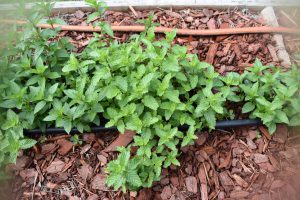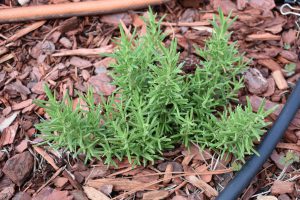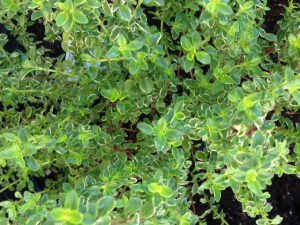So far, the summer of 2019 has been very hot and humid. Plant heat stress was compounded due to this year’s extremely dry spring. Fortunately, there are several herbs that can tolerate drought and heat, and some even thrive on it. Here are a few herbs to think about trying this summer.
Lavender
Lavender thrives in low organic matter soils that are also well drained. Sometimes small rocks are added to the soil to improve drainage if the soil drains poorly. If the garden is mulched, make sure the mulch is several inches away from the main stem, since fungal stem rots are common in humid climates. Ed Gillman notes, in his EDIS publication FPS-337 on lavender that lavender is very sensitive to pH, and that it should be kept above 6. This is particularly noteworthy since many soils in the Florida panhandle are very acidic, at pH 5.5 or below. Lavender grows between two to three feet tall generally, but smaller cultivars exist as well. It does not respond well to excess irrigation, so make sure it is not sited next to water thirsty plants like basil. While lavender is drought and heat tolerant, a little afternoon shade during the hottest parts of summer is welcome.
Mint
There are many different kinds of mint available to the herb gardener, but the most common types are spearmint and peppermint. Mint thrives in the heat when well-watered and will also recover from drought conditions quickly. When planting mint, consider segregating it from other herbs, since it tends to take over any area it’s given. Raised beds are ideal for mint since the borders of a raised bed will keep it in bounds.
Rosemary
Like lavender, rosemary is a somewhat woody herb and can persist for several years as a “shrub” in zone 8 or higher. It is as drought tolerant as lavender and also shares its disdain for overwatering. Several cultivars exist, such as the trailing ‘Prostratus’ cultivar. Growers can expect blue to purple flowers in the winter on evergreen plants. For more information about rosemary, see this IFAS Gardening solutions entry.
Thyme
The smallest evergreen herb that does well in Northwest Florida is thyme. Thyme doesn’t like to completely dry out, but is fairly drought tolerant and excels in rock gardens, where it can cascade down over stone. It needs well drained soil to thrive and should be sited away from competition from other plants. See this Gardening Solutions page for more information
- Woodland Pinkroot Adds Vibrant Color to Spring Landscapes - April 27, 2023
- Easy Care Roses for the Gulf South - April 20, 2023
- Herb Gardening: When Oregano is Flavorless - March 9, 2023



